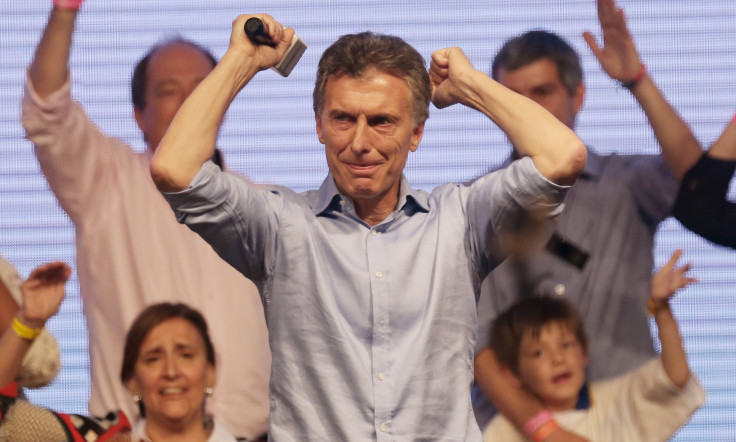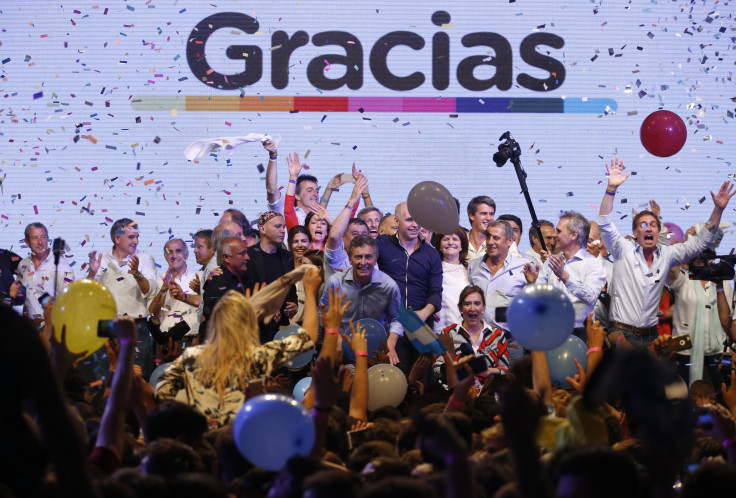Mauricio Macri Heralds 'New Era' As Victory Ends Over A Decade Of 'Kirchnerism' In Argentina

Argentine voters handed a victory to conservative candidate Mauricio Macri in the country’s presidential elections Sunday, ending over a decade of leftist rule in Latin America's third biggest economy. With almost all votes counted, the 56-year-old Buenos Aires mayor was reportedly leading his opponent Daniel Scioli by 51.5 percent to 48.5 percent.
“The popular will has chosen a new president, Mauricio Macri. The people have elected an alternative,” Scioli, the candidate of the ruling Peronist Front for Victory (FPV), told his supporters late Sunday, while conceding defeat in the unprecedented runoff elections.
Sunday’s victory completes a turnaround for Macri, after he lost in the first round of voting to Scioli, the current governor of the province of Buenos Aires. In the October elections, neither candidate commanded enough of a lead to win the vote outright, forcing a run-off.
“Today is a historic day,” Macri, a wealthy businessman and former head of one of the country’s most popular soccer teams, who, during his campaign, promised to revive the country’s beleaguered economy, told his supporters late Sunday. “A wonderful new era begins for Argentina.”

The son of Italian immigrants, Macri was a hugely successful businessman with interests in construction, finance and car manufacturing. In 1991, he was kidnapped and kept captive for 12 days by a gang of corrupt policemen demanding millions in ransom. He has since said that he decided to pursue a career in politics because of those 12 days in captivity.
Before forming his center-right party Compromiso para el Cambio (Commitment to Change) in 2003, he also served as one of the most successful presidents of the Boca Juniors football club -- a role he played from 1996 to 2008. A favorite candidate of big businesses and foreign investors, Macri is expected to be Argentina's most economically liberal leader since the 1990s.
“Foreign investors got their wish,” Washington-based emerging markets analyst Gary Kleiman, told Reuters. “Macri's win signals a decisive break with the Kirchner-Fernandez legacy of creditor confrontation and economic mismanagement.”
For more than 12 years, “Kirchnerism,” marked by strict currency controls, trade protectionism, heavy taxes on agricultural exports and widespread allegations of systemic corruption, has been the dominant political discourse in Argentina, with Cristina Fernandez de Kirchner succeeding her late husband, Nestor Kirchner, to the top job.
Campaigning in the midst of double-digit inflation, which some estimates peg at nearly 25 percent, and a stagnant economy, Macri’s Cambiemos (Let’s Change) coalition vowed to restore the rules of a market economy and lift all capital controls -- a policy that opponents derided as “savage capitalism.”
Macri also pledged to focus on reducing inflation, fixing the country’s largest fiscal deficit in 30 years and luring back international investment. Additionally, he promised to negotiate with foreign creditors who have sued Argentina in U.S. courts for unpaid debts, unlike Kirchner, who likened American hedge funds to “vultures.”
Macri is also expected to work toward mending ties with the U.K. -- which have been hurt by longstanding territorial disputes over the Falklands -- and realign Argentina’s foreign policy away from Venezuela.
© Copyright IBTimes 2024. All rights reserved.






















